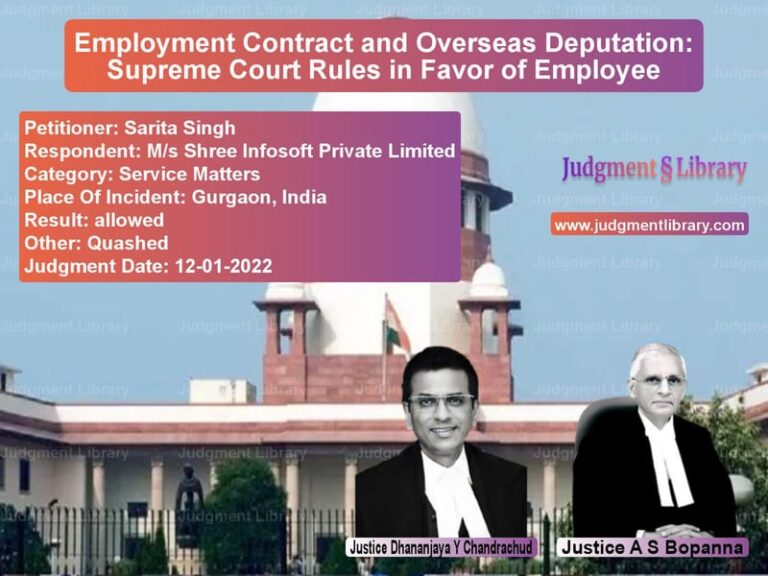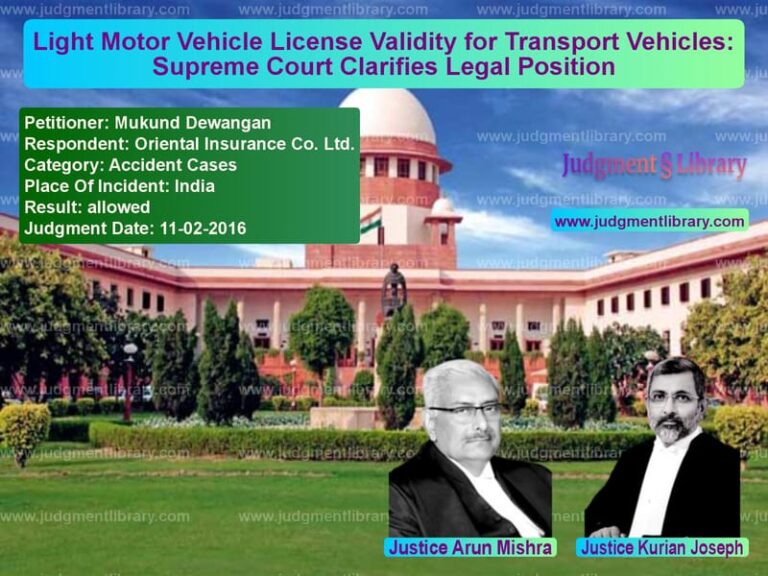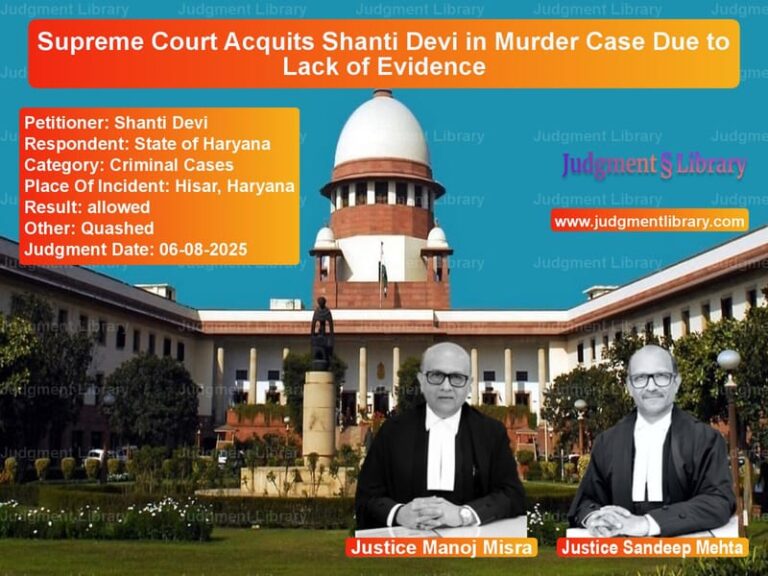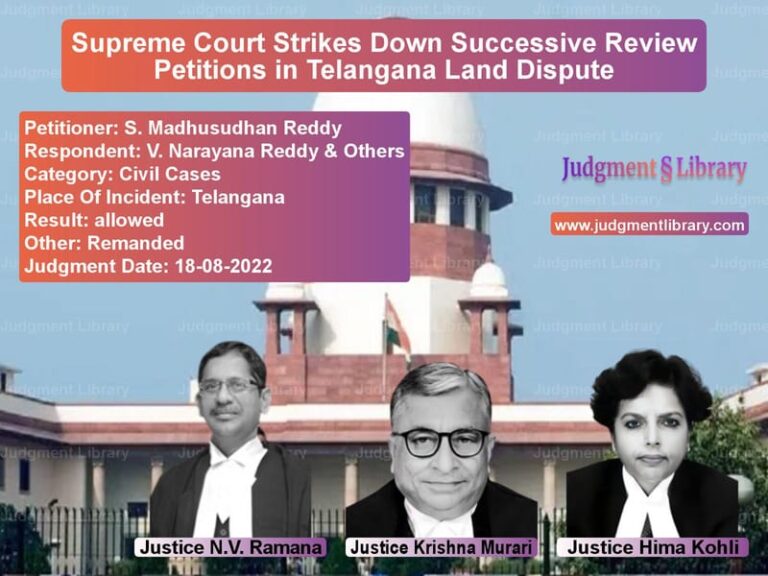Supreme Court Rules on Abatement of Criminal Appeals Due to Death of Accused
The Supreme Court of India, in the case of Uma Shanker Sharma vs. The Registrar General, Hon’ble High Court of Judicature at Allahabad, ruled that a criminal appeal abates upon the death of the sole appellant. This case highlights the legal principles governing the continuation or termination of criminal proceedings in the event of the accused’s death.
Background of the Case
The appeal before the Supreme Court was filed by Uma Shanker Sharma, who had challenged an order of the High Court of Allahabad. The details of the charges against the appellant were not examined in depth due to the fact that the case did not proceed to its merits after the appellant’s demise.
On July 27, 2021, the appellant passed away. His legal representative, through counsel Ms. Manisha Ambwani, submitted a death certificate and requested the court to formally recognize that the appeal had abated in accordance with legal provisions.
Legal Provisions on Abatement of Criminal Appeals
The primary legal framework governing such cases is Section 394 of the Code of Criminal Procedure (CrPC), 1973, which states:
“Every appeal under Section 377 or Section 378 shall finally abate on the death of the accused: Provided that where the appeal is against a sentence of fine, it shall not abate but shall continue against the legal representative of the deceased.”
This provision makes it clear that in cases where the appeal is for an acquittal or reduction of sentence, the proceedings come to an end upon the death of the accused. However, if the case involves a fine or financial penalty, it can continue against the legal heirs of the deceased.
Arguments in the Case
Petitioner’s Arguments
The legal representative of the deceased appellant submitted the following arguments:
- The appellant passed away on July 27, 2021, making further legal proceedings moot.
- A certified copy of the death certificate was presented as documentary proof.
- Under established legal precedent, a criminal appeal must abate upon the death of the accused.
- The presence of legal heirs does not allow for the continuation of the case unless it involves a fine or property-related matter.
Respondent’s Arguments
The respondent, represented by the Registrar General of the Allahabad High Court, submitted:
- They had no objections to the appeal being declared abated, as the death certificate was legitimate.
- The law on abatement under Section 394 CrPC is clear, and the matter should be disposed of accordingly.
Supreme Court’s Observations and Judgment
The Supreme Court carefully examined the relevant provisions of CrPC and observed:
“Under the statutory framework, a criminal appeal abates upon the death of the sole accused. The presence of legal heirs does not provide grounds for continuation unless the case involves a sentence of fine or property-related matters.”
1. Precedents Supporting the Abatement of Criminal Appeals
The Court relied on prior judgments, including:
- Karam Singh v. State of Punjab – which held that criminal liability is personal and cannot extend beyond the death of an accused.
- Gopal v. State of Maharashtra – which reaffirmed that appeals in personal criminal liability cases cannot continue posthumously.
2. Applicability of Section 394 CrPC
The Court further clarified:
“Criminal jurisprudence dictates that unless a financial penalty is involved, the appeal abates, as the objective of criminal punishment ceases with the death of the accused.”
3. Rationale for Abatement
The Court ruled that:
- Since the appeal was against a criminal conviction without a fine component, no grounds existed for its continuation.
- Allowing such appeals to continue would create unnecessary litigation with no practical outcome.
- The primary aim of criminal prosecution is deterrence and retribution, both of which become irrelevant after the accused’s death.
Final Judgment
The Supreme Court dismissed the appeal and ruled:
“In such circumstances, the appeal abates on account of the death of the sole appellant. No further orders are necessary.”
Key Takeaways from the Judgment
- Criminal appeals abate upon the death of the accused unless they involve financial penalties.
- Legal heirs cannot continue appeals unless the case relates to recoverable fines.
- The ruling is in accordance with Section 394 CrPC and past Supreme Court precedents.
- The judgment reinforces the personal nature of criminal liability.
Conclusion
This case reaffirms the long-standing principle that criminal appeals cannot survive the accused’s death unless they involve a sentence of fine. By applying Section 394 CrPC consistently, the Supreme Court ensures procedural clarity and prevents unnecessary litigation.
Judges: The judgment was delivered by B.V. Nagarathna.
Petition Result: Dismissed
Petitioner Name: Uma Shanker Sharma.Respondent Name: The Registrar General, Hon’ble High Court of Judicature at Allahabad.Judgment By: Justice B.V. Nagarathna.Place Of Incident: Allahabad, Uttar Pradesh.Judgment Date: 20-10-2021.
Don’t miss out on the full details! Download the complete judgment in PDF format below and gain valuable insights instantly!
Download Judgment: uma-shanker-sharma-vs-the-registrar-genera-supreme-court-of-india-judgment-dated-20-10-2021.pdf
Directly Download Judgment: Directly download this Judgment
See all petitions in Bail and Anticipatory Bail
See all petitions in Fraud and Forgery
See all petitions in Custodial Deaths and Police Misconduct
See all petitions in Judgment by B.V. Nagarathna
See all petitions in dismissed
See all petitions in Declared Infructuous
See all petitions in supreme court of India judgments October 2021
See all petitions in 2021 judgments
See all posts in Criminal Cases Category
See all allowed petitions in Criminal Cases Category
See all Dismissed petitions in Criminal Cases Category
See all partially allowed petitions in Criminal Cases Category







